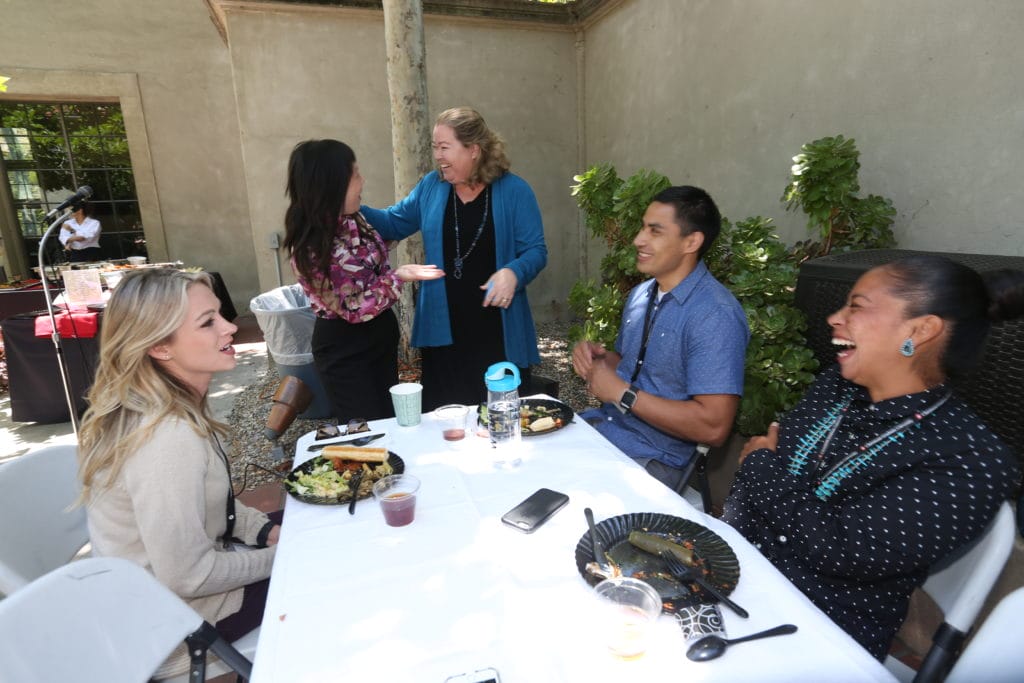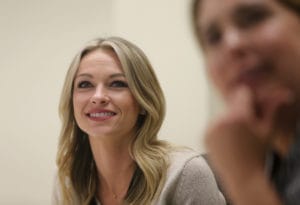CNA Fellowship Students Arrive for Orientation

Less than 1 percent.
That statistic troubles Kendra Buck, a member of the inaugural class of the university’s Claremont Native American Fellowship (CNAF) recipients. It refers to the dismally low representation of Native Americans in higher education, especially in graduate programs, and Buck said she learned about it from one of her school mentors.
It is also a statistic she hopes to one day change as a teacher.
“I would become a teacher no matter what because I am determined to make a difference,” said Buck, a member of the Navajo community who was born and raised in Pomona. “But this fellowship allows me a unique opportunity to pursue my goals and challenge the educational system.”
The university recently established a partnership with the US Department of Education’s Office of Indian Education that provides a $1 million grant to support teacher training for Native American students who wish to become teachers and serve children in their communities. The university announced the partnership in December.
School of Educational Studies Interim Dean DeLacy Ganley led the drive to develop this new program, which provides selected students with full tuition expenses as well as a monthly living stipend to help them earn a preliminary K-12 teaching credential and master’s degree in 15 months.
“Our SES mission has historically led us to work in partnership with communities that are often overlooked,” Ganley said. “I was thrilled that we could add the CNAF program as another offering for deserving students like the ones in this inaugural group.”
The program asks participants for an equal exchange of their time and talents for funding support: 15 months of teacher service to Native American students in exchange for 15 months of tuition and living support.
“When I’m done at CGU, I plan to teach as a secondary school social science teacher in a Native community,” said Buck, who will look at teaching opportunities in her family homelands on the Navajo reservation in Teec Nos Pos, Arizona, or another tribal community in the region. “My commitment is real and unwavering. Nothing can deter me from my goal. I’ve made it this far, and so will my students.”
Along with Buck, the other CNAF students are Marlin Kingi, a member of the Oglala Sioux Tribe who was born in New Zealand and moved to South Dakota when he was 9 years old; Tara Schall, born and raised in Long Beach and whose family is part of the Creek tribe; and Nicole Dorst, a member of the Oklahoma-based Citizen Potawatomi Nation who says she grew up “in and around” Claremont but never dreamed she would ever attend one of The Claremont Colleges.
“I never imagined I’d cross over to the collegiate side of the Claremont community,” she said. “It’s very humbling and quite surreal to step onto campus. I’m very grateful for the opportunity to participate on the ‘other side’ of Claremont!”
In addition to requiring graduates of the program to serve as teachers to Native American populations, the fellowship’s additional eligibility requirements—including the definition of “Indian” used by the program—can be found on the university’s CNAF page.
For Schall and her classmates, the CNAF program has had a decisive positive impact on their educational career trajectory and future opportunities. Though each expressed similar determination to succeed even without any financial help, they acknowledged the fellowship’s power to create new opportunities for them … and to challenge the troubling statistic that Buck first learned from her mentor.
“I’m sure I would become a teacher no matter what, but this fellowship is an absolute blessing,” Schall said. “Would I have been able to obtain this kind of world-class education to serve as a foundation for my career without it? Not a chance. This fellowship is providing me with the opportunity to make my dream come true.”

For Kingi, who spent the past four years helping low-income families in San Bernardino County in the Morongo offices of Temporary Assistance for Needy Families, the CNAF was brought to his attention by a coworker just a month after the university announced the new fellowship program.
“If it hadn’t been for my awesome coworker, I’m guessing I would have missed it,” he said. “I never would have dreamed of coming to a school like CGU. It was out of my budget. But the fellowship changed that.
For Ganley, the CNAF aligns with the SES mission to train educators for communities in need of the most help.
“We’re delighted to have them all as a part of the SES family,” she said, “and even happier that they are acquiring the tools needed to be the kind of educator committed and able to advance educational excellence and equity in their communities.”
The fellowship program is open to new applicants, who can learn more at the CNAF page on CGU’s website.